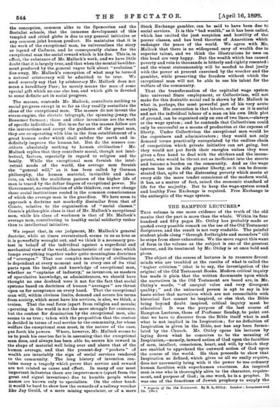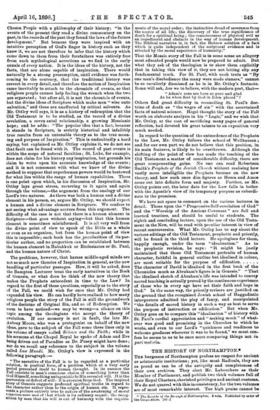THE BAMPTON LECTURES.• Tuts volume is one more evidence of
the truth of the old maxim that the part is more than the whole. Within its font hundred and fifty pages Mr. Ottley has probably made or quoted every possible remark on the use of the Old Testament Scriptures, and the result is not very readable. The painful student plods along "through forthrights and meanders" till he stops from sheer exhaustion. We the more regret this want of form in the volume as the subject is one of the greatest interest, and its treatment by Mr. Ottley is at once bold and pious.
The object of the course of lectures is to reassure devout minds who are troubled at the results of what is called the- "higher criticism " (that is to say, the investigation of the origins) of the Old Testament Books. Modern critical inquiry has made it plain that the written documents upon which the narratives in the Old Testament are based are, in Mr- Ottley's words, " of unequal value and very divergent quality ; " and the unlearned person is apt to say in his haste either that narratives which are not reconcilable with historical fact cannot be inspired, or else that, the Bible being beyond doubt inspired, critical inquiry must be atheistical. It was the purpose of the last course of Barn pton Lectures, those of Professor Sanday, to point out that we have to discover from the Bible itself what is and what is not implied in its Inspiration ; for no definition of Inspiration is given in the Bible, nor has any been formu- lated by the Church. Mr. Ottley opens his lectures by laying down what he conceives to be the meaning of Inspiration,—namely, inward action of God upon the faculties of men, intellect, conscience, heart, and will, by which they are enabled to apprehend the outward action of God upon the course of the world. He then proceeds to show that Inspiration so defined, which gives us all we really require,. does not necessarily bring with it the power to use ordinary human faculties with superhuman exactness. An inspired man is one who is thoroughly alive to the character, require- ment, and purpose of God ; in one word, be is a prophet. It was one of the functions of Jewish prophecy to supply the • Asparts of tlu Old nab:latent. By B.. L. Ottley. London : Longman. and Co. [ilia.]
Chosen People with a philosophy of their history; "in the events of the present they read a divine commentary on the past, in the records of the past they found the laws of the future development." But because they were inspired with an intuitive perception of God's finger in history such as they knew it, we are not therefore to infer that the history which came down to them from their forefathers was entirely free from such mythological accretions as we find in the early annals of every nation. It is the ideas of the history, not the facts, that are alone capable of inspiration. There would naturally be a strong presumption, until evidence was forth- coming to the contrary, that the traditional history was correct in every detail, and therefore the notion of Inspiration came inevitably to attach to the chronicle of events, so that religious people cannot help feeling the wrench when the two are separated ; but after all, it is not the chronicle of events, but the divine ideas of Scripture which make men " wise unto salvation," and these are unaffected by critical solvents. As Mr. Ottley well says, it is as a history of redemption that the Old Testament is to be studied, as the record of a divine revelation, a coven antal relationship, a growing Messianic hope; and he adds : "The popular idea that a fact, because it stands in Scripture, is strictly historical and infallibly true results from an untenable theory as to the true mean- ing and purpose of Inspiration." This is undoubtedly a hard saying, but explained as Mr. Ottley explains it, we do not see that fault can be found with it. The record of past events is within the scope of natural faculties ; St. Luke, for example, does not claim for his history any inspiration, but grounds his claim to write upon his accurate knowledge of the events ; and it is not consonant with what we know of the divine method to suppose that superhuman powers would be bestowed for what lies within the range of human capabilities. There is one point upon which, in his discussion of Inspiration, Mr. Ottley lays great stress, recurring to it again and again through the volume,—the argument from the analogy of our Lord's two natures. As there was both a human and a divine element in his person, so, argues Mr. Ottley, we should expect a human and a divine element in Scripture. We confess to not seeing what advantage accrues from this argument. The difficulty of the case is not that there is a human element in Scripture—that goes without saying—but that this human element is sometimes misinformed. It is all very well from the divine point of view to speak of the Bible as a whole or even as an organism, but from the human point of view this is impossible; each book has the _peculiarities of its par- ticular author, and no proportion can be established between the human element in Habakkuk or Ecclesiastes or St. Paul, and the human nature of Christ.
The problems, however, that harass middle-aged minds are not so much new theories of Inspiration in general, as the new handling of particular passages. How, it will be asked, does the Bampton Lecturer treat the early narratives in the Book of Genesis, or what does he think of the new theory that makes the Prophets antecedent in time to the Law ? In regard to the first of these questions, especially as to the story of the Fall, we could wish for once that Mr. Ottley had expanded his view. He can hardly have realised to how many religious people the story of the Fall is still the groundwork of the doctrine of Original Sin, and so of Redemption. We seem to have noticed—we may be wrong—a silence on this topic among the theologians who accept the theory of evolution. If our memory is not in fault, the late Mr. Aubrey Moore, who was a protagonist on behalf of the new Ideas. gave to the subject of the Fall some three lines only in his volume of essays called Science and the Faith; while in his sermons at the Chapel Royal he spoke of Adam and Eve being driven out of Paradise as Dr. Posey might have done ; nor do we recall any reference to the subject in the volume called Lux Mundi. Mr. Ottley's view is expressed in the following paragraph :—
" The narrative of the Fall is to be regarded as a particular solution, in poetical form, of a problem which at a very early Period presented itself to human thought. In its essence the Fall consists in man's conscious choice of something lower than God Himself, something antagonistic to His revealed will. It is the perversion or defect of will: it is aversion from God. The inspired story of Genesis suggests profound spiritual truths in regard to the character rather than to the crio-in of human sin. It repre- sents a picture entirely true to nature of the awakening of moral consciousness and of t hat which is its ordinary sequel : the recog- nition by wau that hie will is cut of harmony with the require- ments of the moral order ; the instinctive dread of severance from the source of all life ; the discovery of the true significance of death for a spiritual being ; the consciousness of physical evil as an impediment and obstacle in the way of human development. The Biblical narrative is, in fact, the Hebrew solution of a fact which is quite independent of the scrintural evidence and is attested by the moral experience of humanity."
That the Mosaic story of the Fall is in some sense an allegory most educated people would now be prepared to admit. Bat
what they ask of the theologian is to show them explicitly that in taking this view of it, they are not letting slip any fundamental truth. For St. Paul, with such texts as "By one man's disobedience the many were made sinners," cannot be so cavalierly dismissed as he is in Mr. Ottley's footnote. Some will ask, Are we to believe, with the modern poet, that-
" Adam's sons are born as pure and glad As he when first by God in Eden placed" ?
Others find great difficulty in reconciling St. Paul's doc- trine of death as " the wages of sin" with the ascertained facts of natural science. Hegel thought the story of the Fall worth an elaborate analysis in his " Logic," and we wish that Mr. Ottley, at the cost of sacrificing many pages of general reflection, had devoted his great talents to an exposition very much needed.
In regard to the question of the antecedence of the Prophets to the Law, Mr. Ottley follows the school of Wellhansen ; and for our own part we do not believe that this position, in its main features, is likely to be overthrown. Although the shifting of the point of view has made the teaching of the Old Testament a matter of considerable difficulty, there are great compensating gains. No one can read Robertson Smith's Prophets of the Jewish Church without realising how vastly more intelligible the Prophets become on the new
theory, and how such once dim figures as Hosea and Amos come out into definite form and majesty. Further, as Mr. Ottley points out., the later date for the Law falls in better with the Apostle's view of its temporary purpose as subordi-
nate to the promises.
We have not space to comment on the various lectures in
detail. Those upon the " Progressive Self-revelation of God" and the " Worship of the Ancient Covenant " are full and
learned treatises, and should be useful to students. The eighth and concluding lecture, upon the use of the Old Testa- ment in the New, will be read with peculiar interest in view of recent controversies. What Mr. 0 ttley has to say about the various editings of the Old Testament, prophetic and priestly, will be found in the third lecture. He apologises for them, happily enough, under the term "idealisation." As to the prophetic revision, he says: "It might be justly maintained that these Old Testament portraits of human character, faithful in general outline but idealised in colour, are most suitable for the purpose of edification The character of David is idealised in the first book of the Chronicles much as Abraham's figure is in Genesis." " That the idealised sketch of Abraham's life was intended to convey sacred teaching is actually proved by the continuous experience of those who in every age have set their faith and hope in God." In the same way, the priestly revisers are justified on the ground that the recognised Jewish school of Haggadistio interpreters admitted the play of fancy, and manipulated "the details of sacred history in such a way as best to serve the purpose of instruction or edification." But when Mr. Ottley goes on to compare this " idealisation " of history with St. Paul's cordial appreciation and " making much " of what- ever was good and promising in the Churches to which he wrote, and even to our Lord's "quickness and readiness to welcome goodness wherever it was to be found," we must con- fess he seems to us to be once more comparing things not in pari mataria.



































 Previous page
Previous page